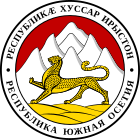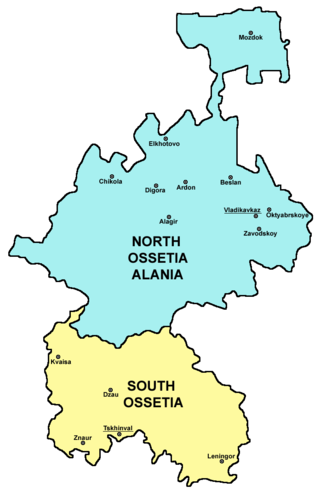
Ossetia is an ethnolinguistic region located on both sides of the Greater Caucasus Mountains, largely inhabited by the Ossetians. The Ossetian language is part of the Eastern Iranian branch of the family of Indo-European languages. Most countries recognize the Ossetian-speaking area south of the main Caucasus ridge as lying within the borders of Georgia, but it has come under the control of the de facto government of the Russian-backed Republic of South Ossetia – the State of Alania. The northern portion of the region consists of the Republic of North Ossetia-Alania within the Russian Federation.

South Ossetia, officially the Republic of South Ossetia or the State of Alania is a partially recognised landlocked state in the South Caucasus. It has an officially stated population of just over 56,500 people (2022), who live in an area of 3,900 square kilometres (1,500 sq mi), with 33,000 living in the capital city, Tskhinvali.

Eduard Dzhabeyevich Kokoyty is an Ossetian politician who served as President of the partially recognized state of South Ossetia from 2001 to 2011.

The Georgian–Ossetian conflict is an ethno-political conflict over Georgia's former autonomous region of South Ossetia, which evolved in 1989 and developed into a war. Despite a declared ceasefire and numerous peace efforts, the conflict remained unresolved. In August 2008, military tensions and clashes between Georgia and South Ossetian separatists erupted into the Russo-Georgian War. Since then, South Ossetia has been under Russian occupation.

South Ossetia, a mostly unrecognized republic in the South Caucasus, formerly the South Ossetian Autonomous Oblast within the Georgian Soviet Socialist Republic with its capital in Tskhinvali, held a referendum on independence on November 12, 2006.

The Communist Party of South Ossetia is a communist party in South Ossetia. The party was founded in 1993. As of 2004, the party claimed a membership of 1,500. The party seeks recognition of the Republic of South Ossetia, which is internationally recognized by most countries as a part of Georgia.
Dmitry Ivanovich Sanakoyev is a South Ossetian and Georgian politician, a former official in the secessionist government of South Ossetia and later, from 2007 to 2022, served as the Head of the Provisional Administration of South Ossetia, a rival entity established in the Georgian-controlled territories in the South Ossetia region by the Georgian government.

The People of South Ossetia for Peace movement was the opposition party and political movement in South Ossetia which was formed by the ethnic Ossetians who had been formerly members of the secessionist government in Tskhinvali and outspoken critics of de facto separatist regime in Tskhinvali, headed at that time by Eduard Kokoity.

The Administration of the temporary administrative-territorial unit on the territory of the former South Ossetia Autonomous District, shortly known as the Provisional Administration of South Ossetia, is an administrative body that Georgia regards as the legal government of South Ossetia. The administration was set up by the Georgian government as a transitional measure leading to the settlement of South Ossetia’s status. The area lies within the territory of the former South Ossetian Autonomous Oblast which was abolished by the Georgian government in 1990. Since then South Ossetia has no autonomous status within Georgia.
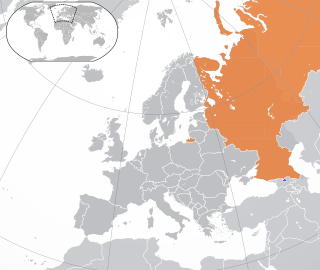
Russia–South Ossetia relations refers to the bilateral relationship between Russia and the Republic of South Ossetia, a disputed region in the South Caucasus, located on the territory of the South Ossetian Autonomous Oblast within the former Georgian Soviet Socialist Republic.

Parliamentary elections were held in South Ossetia on 31 May 2009. The result was a victory for the ruling Unity Party, which won seventeen of the 34 seats. Two opposition parties were not permitted to run out of concern that they might not be loyal to President Eduard Kokoity.

Ethnic cleansing of Georgians in South Ossetia was a mass expulsion of ethnic Georgians conducted in South Ossetia and other territories occupied by Russian and South Ossetian forces, which happened during and after the 2008 Russia–Georgia war. Overall, at least 20,000 Georgians were forcibly displaced from South Ossetia.
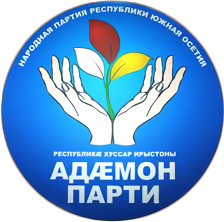
The People's Party of South Ossetia is a social liberal political party in South Ossetia, a partially recognized Caucasian republic, considered by most countries to be a part of Georgia. The party is known for being staunch supporters of former president Eduard Kokoity.

Presidential elections were held in South Ossetia on 13 November 2011. A referendum was held on the same day. A run-off was held on 27 November, but the result were invalidated by the Supreme Court of South Ossetia. A new election was scheduled for 25 March 2012.
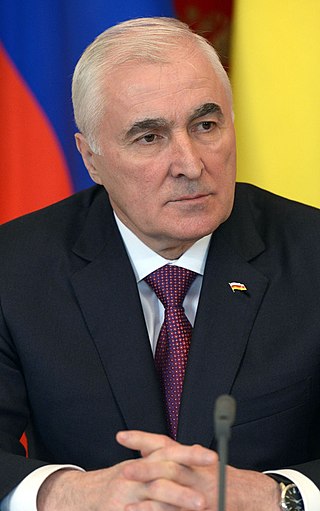
Leonid Kharitonovich Tibilov is a South Ossetian politician who served as the President of South Ossetia from 2012 to 2017 after winning the 2012 South Ossetian presidential election.

Presidential elections were held in South Ossetia on 9 April 2017 alongside a referendum on changing the official name of the state to "Republic of South Ossetia–the State of Alania", or "South Ossetia–Alania" for short. Incumbent President Leonid Tibilov ran for a second and final term in office, but was defeated by Anatoly Bibilov of the United Ossetia party.
South Ossetia is an autonomous region in Georgia, approximately 1,000 metres (3,300 ft) above sea level on the slopes of the Greater Caucasus. Although it declared independence in 2008, only a few countries acknowledge it. The region is inhabited by Ossetians, an Iranian ethnic group. According to Russia, Nicaragua, Venezuela, Syria and Nauru, it is one of the world's newest independent states. All other states and international organisations consider South Ossetia an autonomous region of Georgia, functioning as a de facto state for twenty years after declaring independence and conducting a successful armed rebellion. Its Georgian inhabitants have been displaced. South Ossetia has been a source of tension for a number of years, with Georgia and Russia's political differences impeding peaceful independence and breeding a turbulent series of events which undermine the Universal Declaration of Human Rights.

Presidential elections were held in the disputed territory of South Ossetia on 10 April 2022. As none of the presidential nominees obtained at least 50% of the votes, a runoff was held on 8 May 2022, between the top two candidates, Alan Gagloev and incumbent president Anatoly Bibilov.

South Ossetia is a partially recognized and Russian-occupied separatist state internationally recognized as part of Georgia. It is mainly inhabited by Ossetians, an ethnic group also dominant in North Ossetia, which is part of Russia. South Ossetia separated itself from Georgia following the 1991–1992 South Ossetia War with the help of Russia, remaining ever since as a state closely allied with this country.
Vyacheslav Gobozov is a South Ossetian politician who has been the Chairman of the Fatherland Socialist Party since its inception for the 2009 South Ossetian parliamentary election. He is one of the leading figures in the South Ossetian anti-Russian opposition. However, he is also a staunch Ossetian nationalist and supports the Republic's independence and maintains a pragmatic approach to when and where to oppose and accept Russian support.
